BMP4002 Business Law: Legal System, Classification of Law, Source of Law, and Employment Law
VerifiedAdded on 2023/06/07
|9
|1971
|125
AI Summary
This report covers the legal system, classification of law, source of law, and employment law in BMP4002 Business Law. It defines laws and identifies the respective legal systems in the UK, explains means of classification of laws in the English Legal system, and the role of the following Courts in the English Legal system. It also explains case law as a source of laws, the process of making legislation, and delegated legislation. Lastly, it covers the UK law making process in context of employment law, including statutory duties of employers to their employees and wrongful dismissal and unfair dismissal actions.
Contribute Materials
Your contribution can guide someone’s learning journey. Share your
documents today.
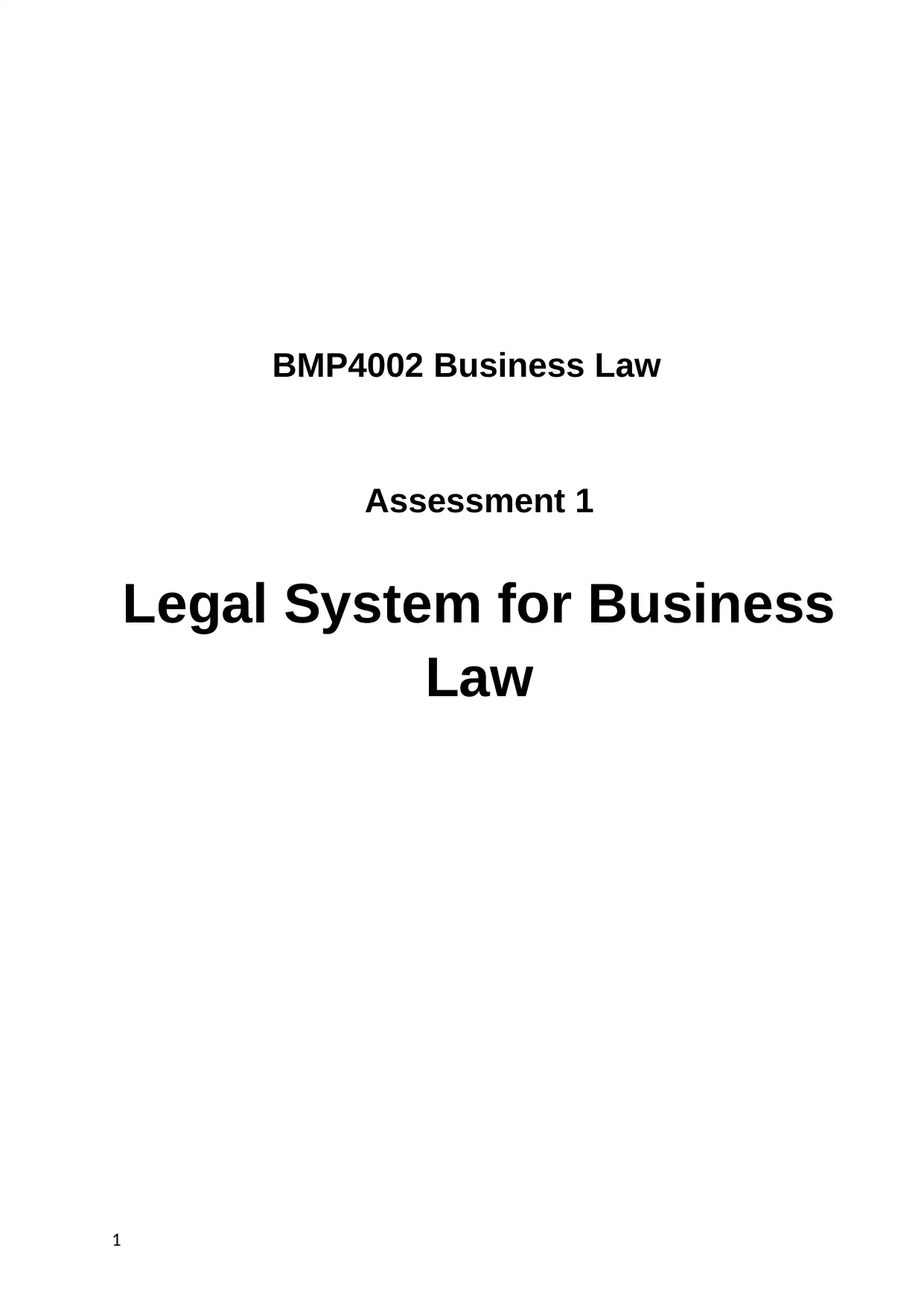
BMP4002 Business Law
Assessment 1
Legal System for Business
Law
1
Assessment 1
Legal System for Business
Law
1
Secure Best Marks with AI Grader
Need help grading? Try our AI Grader for instant feedback on your assignments.
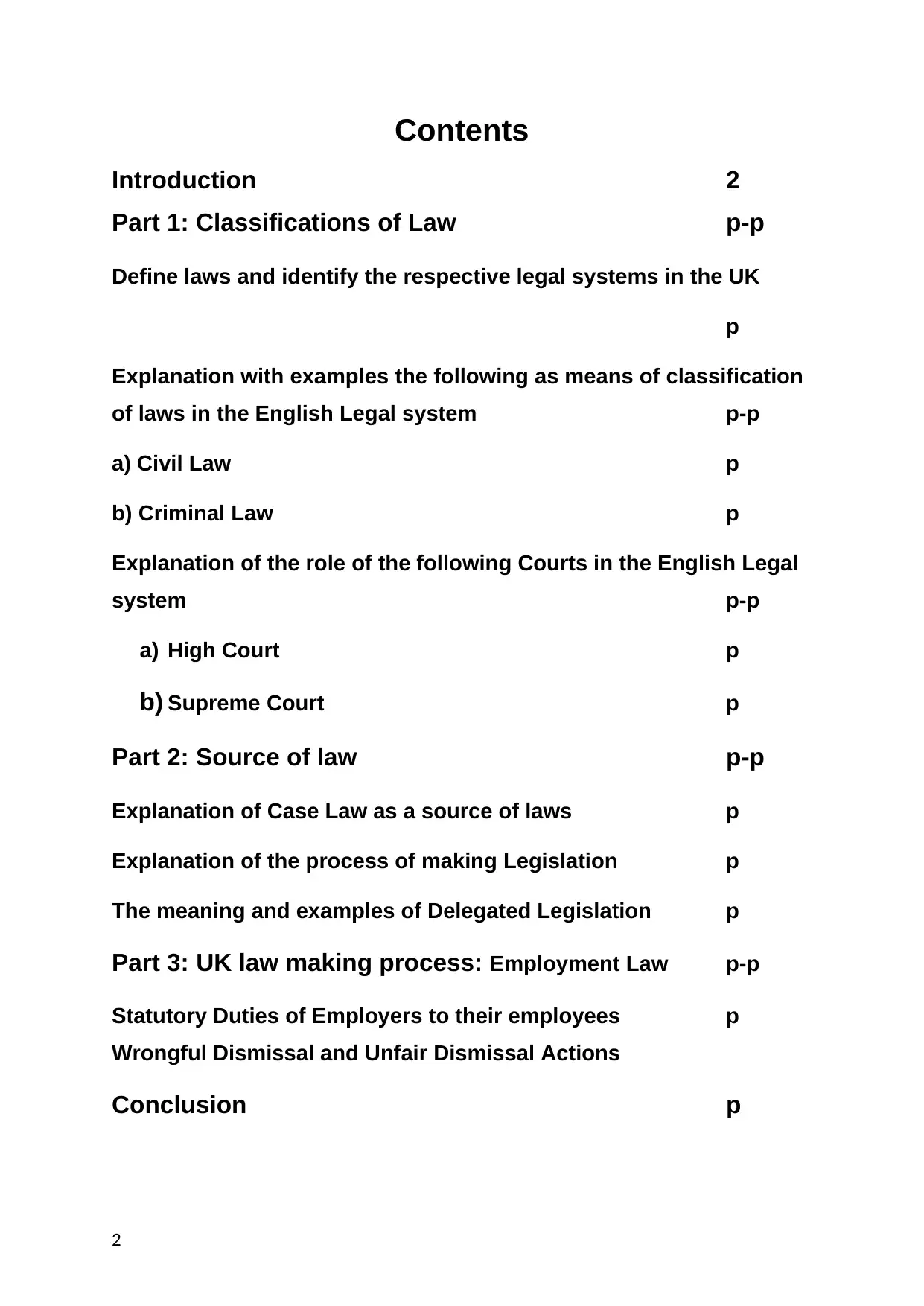
Contents
Introduction 2
Part 1: Classifications of Law p-p
Define laws and identify the respective legal systems in the UK
p
Explanation with examples the following as means of classification
of laws in the English Legal system p-p
a) Civil Law p
b) Criminal Law p
Explanation of the role of the following Courts in the English Legal
system p-p
a) High Court p
b) Supreme Court p
Part 2: Source of law p-p
Explanation of Case Law as a source of laws p
Explanation of the process of making Legislation p
The meaning and examples of Delegated Legislation p
Part 3: UK law making process: Employment Law p-p
Statutory Duties of Employers to their employees p
Wrongful Dismissal and Unfair Dismissal Actions
Conclusion p
2
Introduction 2
Part 1: Classifications of Law p-p
Define laws and identify the respective legal systems in the UK
p
Explanation with examples the following as means of classification
of laws in the English Legal system p-p
a) Civil Law p
b) Criminal Law p
Explanation of the role of the following Courts in the English Legal
system p-p
a) High Court p
b) Supreme Court p
Part 2: Source of law p-p
Explanation of Case Law as a source of laws p
Explanation of the process of making Legislation p
The meaning and examples of Delegated Legislation p
Part 3: UK law making process: Employment Law p-p
Statutory Duties of Employers to their employees p
Wrongful Dismissal and Unfair Dismissal Actions
Conclusion p
2

3
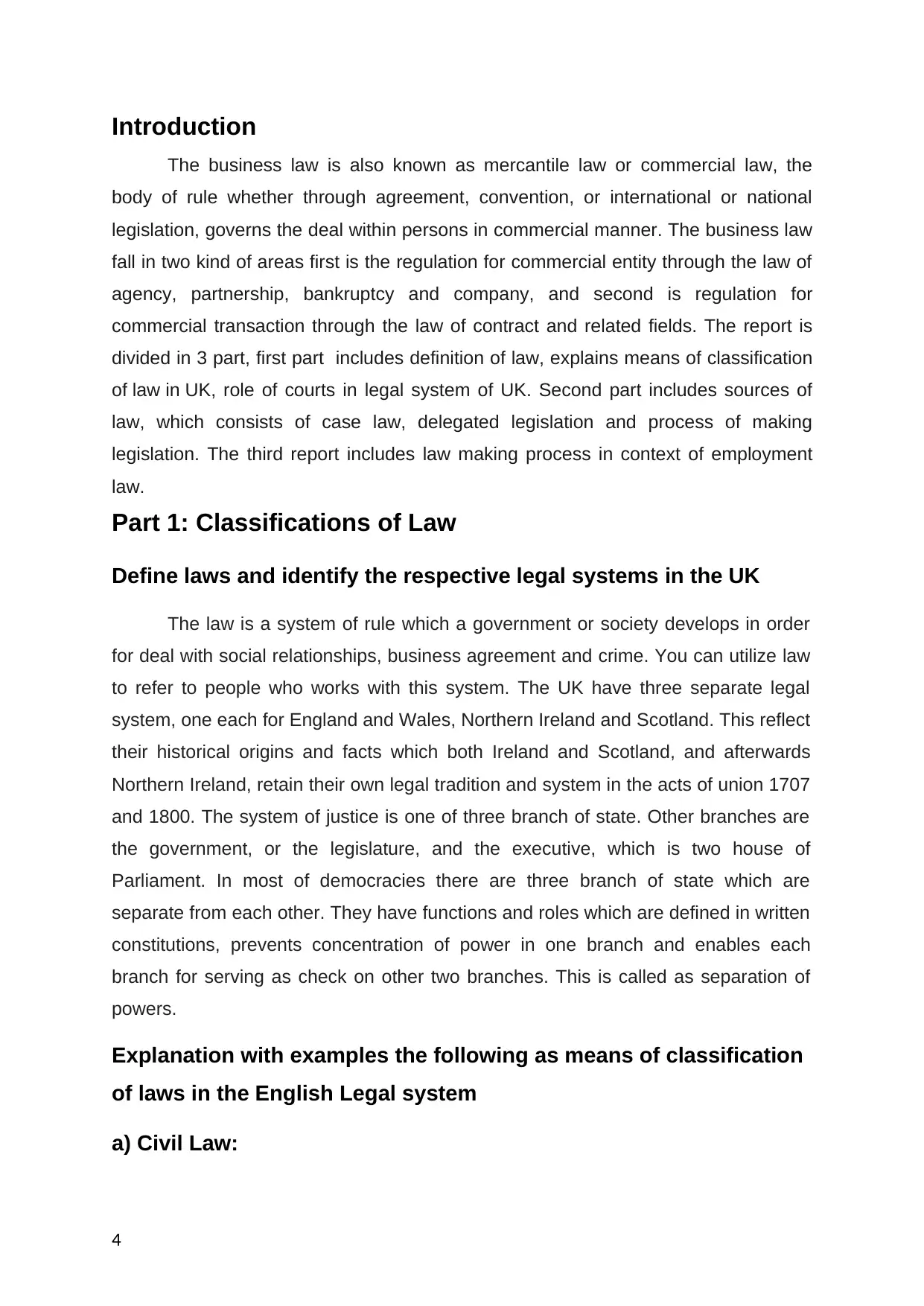
Introduction
The business law is also known as mercantile law or commercial law, the
body of rule whether through agreement, convention, or international or national
legislation, governs the deal within persons in commercial manner. The business law
fall in two kind of areas first is the regulation for commercial entity through the law of
agency, partnership, bankruptcy and company, and second is regulation for
commercial transaction through the law of contract and related fields. The report is
divided in 3 part, first part includes definition of law, explains means of classification
of law in UK, role of courts in legal system of UK. Second part includes sources of
law, which consists of case law, delegated legislation and process of making
legislation. The third report includes law making process in context of employment
law.
Part 1: Classifications of Law
Define laws and identify the respective legal systems in the UK
The law is a system of rule which a government or society develops in order
for deal with social relationships, business agreement and crime. You can utilize law
to refer to people who works with this system. The UK have three separate legal
system, one each for England and Wales, Northern Ireland and Scotland. This reflect
their historical origins and facts which both Ireland and Scotland, and afterwards
Northern Ireland, retain their own legal tradition and system in the acts of union 1707
and 1800. The system of justice is one of three branch of state. Other branches are
the government, or the legislature, and the executive, which is two house of
Parliament. In most of democracies there are three branch of state which are
separate from each other. They have functions and roles which are defined in written
constitutions, prevents concentration of power in one branch and enables each
branch for serving as check on other two branches. This is called as separation of
powers.
Explanation with examples the following as means of classification
of laws in the English Legal system
a) Civil Law:
4
The business law is also known as mercantile law or commercial law, the
body of rule whether through agreement, convention, or international or national
legislation, governs the deal within persons in commercial manner. The business law
fall in two kind of areas first is the regulation for commercial entity through the law of
agency, partnership, bankruptcy and company, and second is regulation for
commercial transaction through the law of contract and related fields. The report is
divided in 3 part, first part includes definition of law, explains means of classification
of law in UK, role of courts in legal system of UK. Second part includes sources of
law, which consists of case law, delegated legislation and process of making
legislation. The third report includes law making process in context of employment
law.
Part 1: Classifications of Law
Define laws and identify the respective legal systems in the UK
The law is a system of rule which a government or society develops in order
for deal with social relationships, business agreement and crime. You can utilize law
to refer to people who works with this system. The UK have three separate legal
system, one each for England and Wales, Northern Ireland and Scotland. This reflect
their historical origins and facts which both Ireland and Scotland, and afterwards
Northern Ireland, retain their own legal tradition and system in the acts of union 1707
and 1800. The system of justice is one of three branch of state. Other branches are
the government, or the legislature, and the executive, which is two house of
Parliament. In most of democracies there are three branch of state which are
separate from each other. They have functions and roles which are defined in written
constitutions, prevents concentration of power in one branch and enables each
branch for serving as check on other two branches. This is called as separation of
powers.
Explanation with examples the following as means of classification
of laws in the English Legal system
a) Civil Law:
4
Secure Best Marks with AI Grader
Need help grading? Try our AI Grader for instant feedback on your assignments.
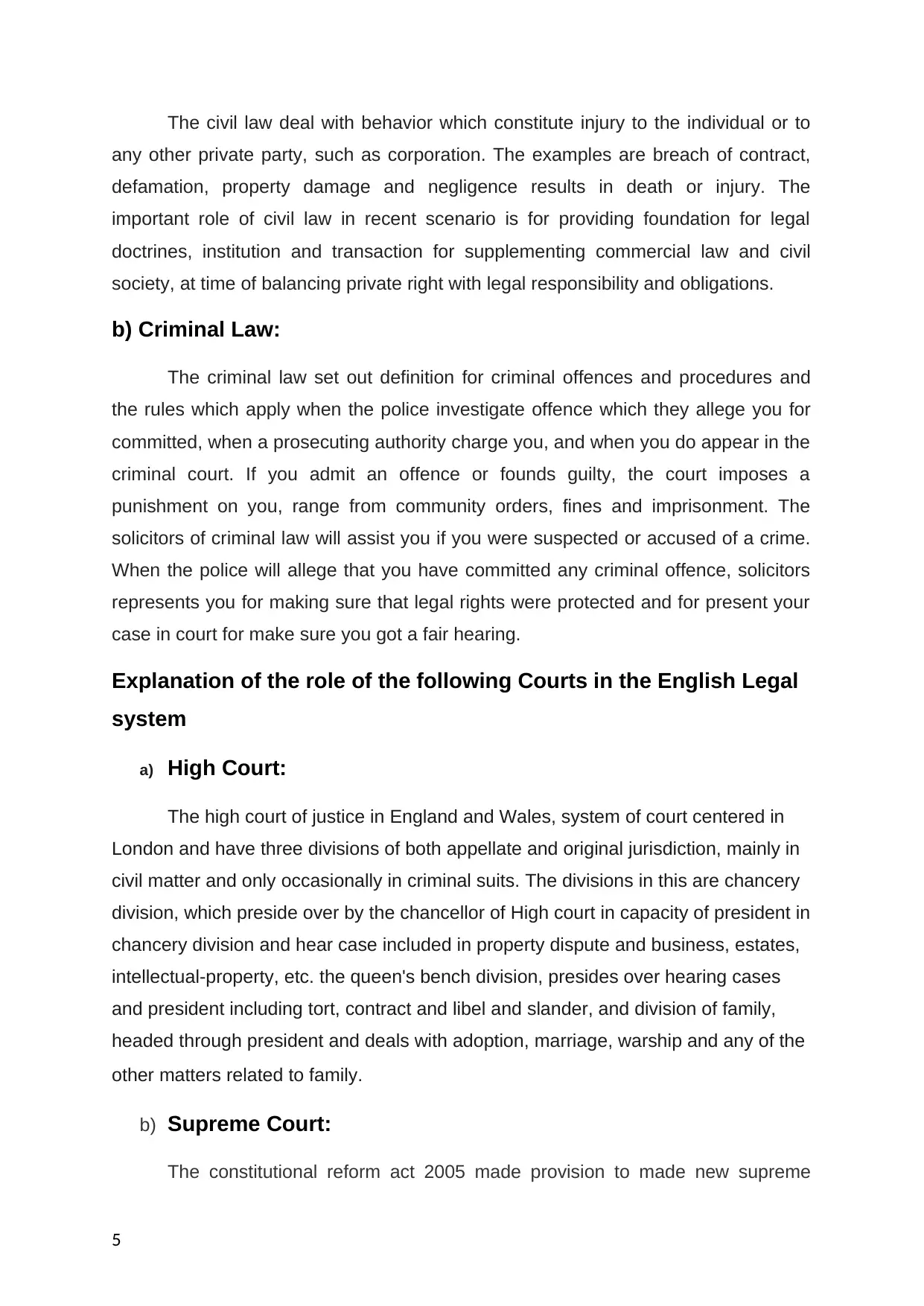
The civil law deal with behavior which constitute injury to the individual or to
any other private party, such as corporation. The examples are breach of contract,
defamation, property damage and negligence results in death or injury. The
important role of civil law in recent scenario is for providing foundation for legal
doctrines, institution and transaction for supplementing commercial law and civil
society, at time of balancing private right with legal responsibility and obligations.
b) Criminal Law:
The criminal law set out definition for criminal offences and procedures and
the rules which apply when the police investigate offence which they allege you for
committed, when a prosecuting authority charge you, and when you do appear in the
criminal court. If you admit an offence or founds guilty, the court imposes a
punishment on you, range from community orders, fines and imprisonment. The
solicitors of criminal law will assist you if you were suspected or accused of a crime.
When the police will allege that you have committed any criminal offence, solicitors
represents you for making sure that legal rights were protected and for present your
case in court for make sure you got a fair hearing.
Explanation of the role of the following Courts in the English Legal
system
a) High Court:
The high court of justice in England and Wales, system of court centered in
London and have three divisions of both appellate and original jurisdiction, mainly in
civil matter and only occasionally in criminal suits. The divisions in this are chancery
division, which preside over by the chancellor of High court in capacity of president in
chancery division and hear case included in property dispute and business, estates,
intellectual-property, etc. the queen's bench division, presides over hearing cases
and president including tort, contract and libel and slander, and division of family,
headed through president and deals with adoption, marriage, warship and any of the
other matters related to family.
b) Supreme Court:
The constitutional reform act 2005 made provision to made new supreme
5
any other private party, such as corporation. The examples are breach of contract,
defamation, property damage and negligence results in death or injury. The
important role of civil law in recent scenario is for providing foundation for legal
doctrines, institution and transaction for supplementing commercial law and civil
society, at time of balancing private right with legal responsibility and obligations.
b) Criminal Law:
The criminal law set out definition for criminal offences and procedures and
the rules which apply when the police investigate offence which they allege you for
committed, when a prosecuting authority charge you, and when you do appear in the
criminal court. If you admit an offence or founds guilty, the court imposes a
punishment on you, range from community orders, fines and imprisonment. The
solicitors of criminal law will assist you if you were suspected or accused of a crime.
When the police will allege that you have committed any criminal offence, solicitors
represents you for making sure that legal rights were protected and for present your
case in court for make sure you got a fair hearing.
Explanation of the role of the following Courts in the English Legal
system
a) High Court:
The high court of justice in England and Wales, system of court centered in
London and have three divisions of both appellate and original jurisdiction, mainly in
civil matter and only occasionally in criminal suits. The divisions in this are chancery
division, which preside over by the chancellor of High court in capacity of president in
chancery division and hear case included in property dispute and business, estates,
intellectual-property, etc. the queen's bench division, presides over hearing cases
and president including tort, contract and libel and slander, and division of family,
headed through president and deals with adoption, marriage, warship and any of the
other matters related to family.
b) Supreme Court:
The constitutional reform act 2005 made provision to made new supreme
5
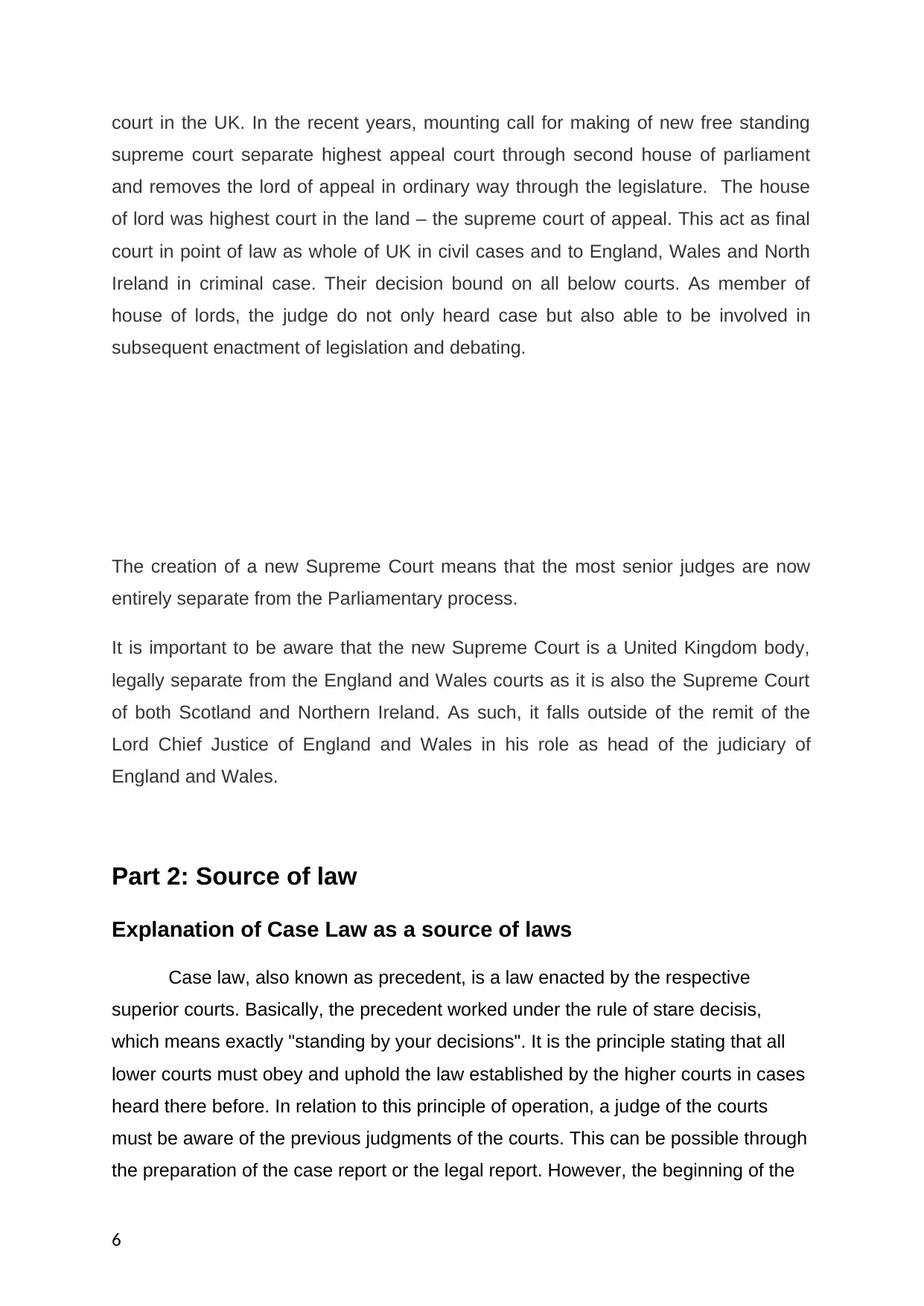
court in the UK. In the recent years, mounting call for making of new free standing
supreme court separate highest appeal court through second house of parliament
and removes the lord of appeal in ordinary way through the legislature. The house
of lord was highest court in the land – the supreme court of appeal. This act as final
court in point of law as whole of UK in civil cases and to England, Wales and North
Ireland in criminal case. Their decision bound on all below courts. As member of
house of lords, the judge do not only heard case but also able to be involved in
subsequent enactment of legislation and debating.
The creation of a new Supreme Court means that the most senior judges are now
entirely separate from the Parliamentary process.
It is important to be aware that the new Supreme Court is a United Kingdom body,
legally separate from the England and Wales courts as it is also the Supreme Court
of both Scotland and Northern Ireland. As such, it falls outside of the remit of the
Lord Chief Justice of England and Wales in his role as head of the judiciary of
England and Wales.
Part 2: Source of law
Explanation of Case Law as a source of laws
Case law, also known as precedent, is a law enacted by the respective
superior courts. Basically, the precedent worked under the rule of stare decisis,
which means exactly "standing by your decisions". It is the principle stating that all
lower courts must obey and uphold the law established by the higher courts in cases
heard there before. In relation to this principle of operation, a judge of the courts
must be aware of the previous judgments of the courts. This can be possible through
the preparation of the case report or the legal report. However, the beginning of the
6
supreme court separate highest appeal court through second house of parliament
and removes the lord of appeal in ordinary way through the legislature. The house
of lord was highest court in the land – the supreme court of appeal. This act as final
court in point of law as whole of UK in civil cases and to England, Wales and North
Ireland in criminal case. Their decision bound on all below courts. As member of
house of lords, the judge do not only heard case but also able to be involved in
subsequent enactment of legislation and debating.
The creation of a new Supreme Court means that the most senior judges are now
entirely separate from the Parliamentary process.
It is important to be aware that the new Supreme Court is a United Kingdom body,
legally separate from the England and Wales courts as it is also the Supreme Court
of both Scotland and Northern Ireland. As such, it falls outside of the remit of the
Lord Chief Justice of England and Wales in his role as head of the judiciary of
England and Wales.
Part 2: Source of law
Explanation of Case Law as a source of laws
Case law, also known as precedent, is a law enacted by the respective
superior courts. Basically, the precedent worked under the rule of stare decisis,
which means exactly "standing by your decisions". It is the principle stating that all
lower courts must obey and uphold the law established by the higher courts in cases
heard there before. In relation to this principle of operation, a judge of the courts
must be aware of the previous judgments of the courts. This can be possible through
the preparation of the case report or the legal report. However, the beginning of the
6
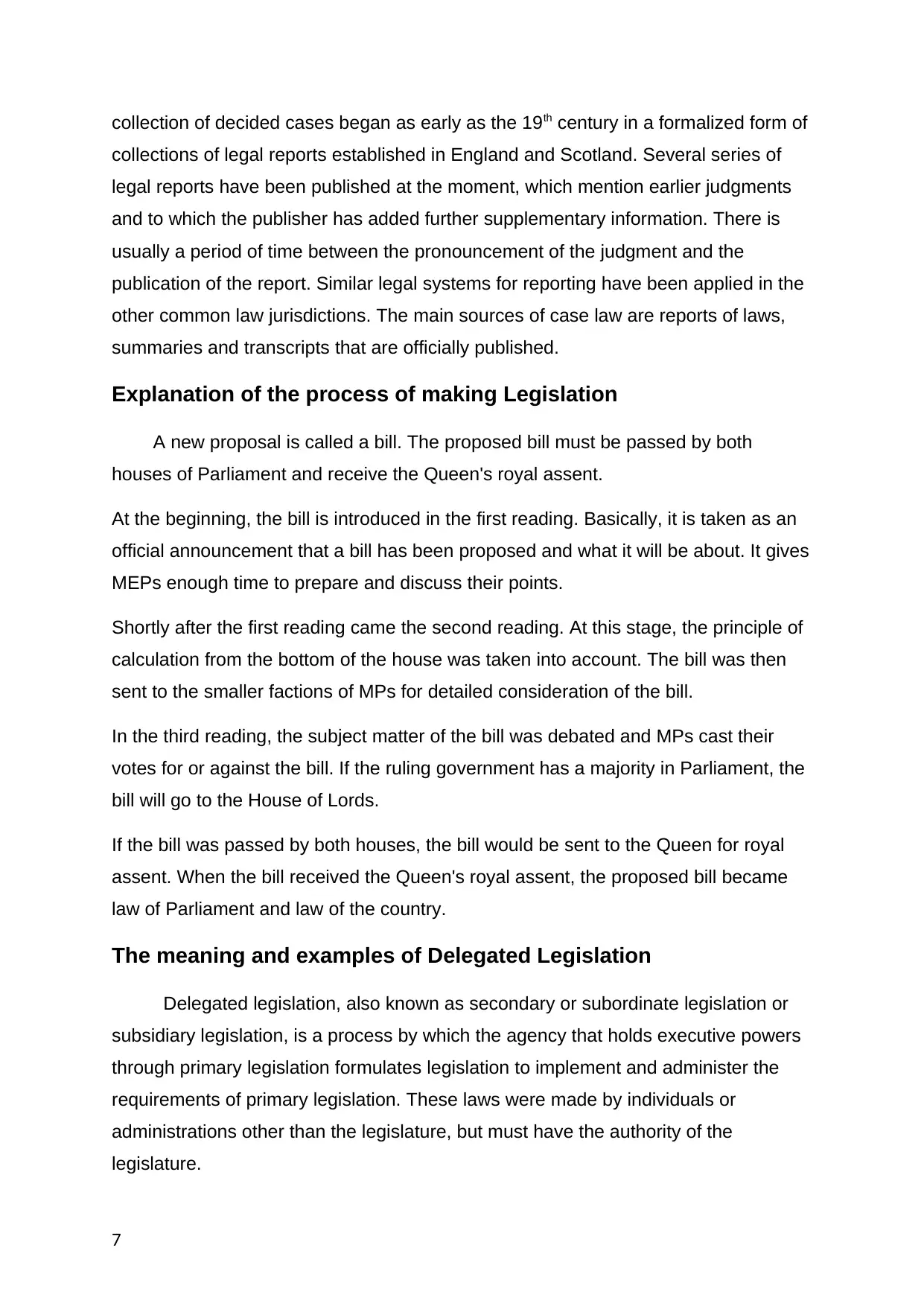
collection of decided cases began as early as the 19th century in a formalized form of
collections of legal reports established in England and Scotland. Several series of
legal reports have been published at the moment, which mention earlier judgments
and to which the publisher has added further supplementary information. There is
usually a period of time between the pronouncement of the judgment and the
publication of the report. Similar legal systems for reporting have been applied in the
other common law jurisdictions. The main sources of case law are reports of laws,
summaries and transcripts that are officially published.
Explanation of the process of making Legislation
A new proposal is called a bill. The proposed bill must be passed by both
houses of Parliament and receive the Queen's royal assent.
At the beginning, the bill is introduced in the first reading. Basically, it is taken as an
official announcement that a bill has been proposed and what it will be about. It gives
MEPs enough time to prepare and discuss their points.
Shortly after the first reading came the second reading. At this stage, the principle of
calculation from the bottom of the house was taken into account. The bill was then
sent to the smaller factions of MPs for detailed consideration of the bill.
In the third reading, the subject matter of the bill was debated and MPs cast their
votes for or against the bill. If the ruling government has a majority in Parliament, the
bill will go to the House of Lords.
If the bill was passed by both houses, the bill would be sent to the Queen for royal
assent. When the bill received the Queen's royal assent, the proposed bill became
law of Parliament and law of the country.
The meaning and examples of Delegated Legislation
Delegated legislation, also known as secondary or subordinate legislation or
subsidiary legislation, is a process by which the agency that holds executive powers
through primary legislation formulates legislation to implement and administer the
requirements of primary legislation. These laws were made by individuals or
administrations other than the legislature, but must have the authority of the
legislature.
7
collections of legal reports established in England and Scotland. Several series of
legal reports have been published at the moment, which mention earlier judgments
and to which the publisher has added further supplementary information. There is
usually a period of time between the pronouncement of the judgment and the
publication of the report. Similar legal systems for reporting have been applied in the
other common law jurisdictions. The main sources of case law are reports of laws,
summaries and transcripts that are officially published.
Explanation of the process of making Legislation
A new proposal is called a bill. The proposed bill must be passed by both
houses of Parliament and receive the Queen's royal assent.
At the beginning, the bill is introduced in the first reading. Basically, it is taken as an
official announcement that a bill has been proposed and what it will be about. It gives
MEPs enough time to prepare and discuss their points.
Shortly after the first reading came the second reading. At this stage, the principle of
calculation from the bottom of the house was taken into account. The bill was then
sent to the smaller factions of MPs for detailed consideration of the bill.
In the third reading, the subject matter of the bill was debated and MPs cast their
votes for or against the bill. If the ruling government has a majority in Parliament, the
bill will go to the House of Lords.
If the bill was passed by both houses, the bill would be sent to the Queen for royal
assent. When the bill received the Queen's royal assent, the proposed bill became
law of Parliament and law of the country.
The meaning and examples of Delegated Legislation
Delegated legislation, also known as secondary or subordinate legislation or
subsidiary legislation, is a process by which the agency that holds executive powers
through primary legislation formulates legislation to implement and administer the
requirements of primary legislation. These laws were made by individuals or
administrations other than the legislature, but must have the authority of the
legislature.
7
Paraphrase This Document
Need a fresh take? Get an instant paraphrase of this document with our AI Paraphraser
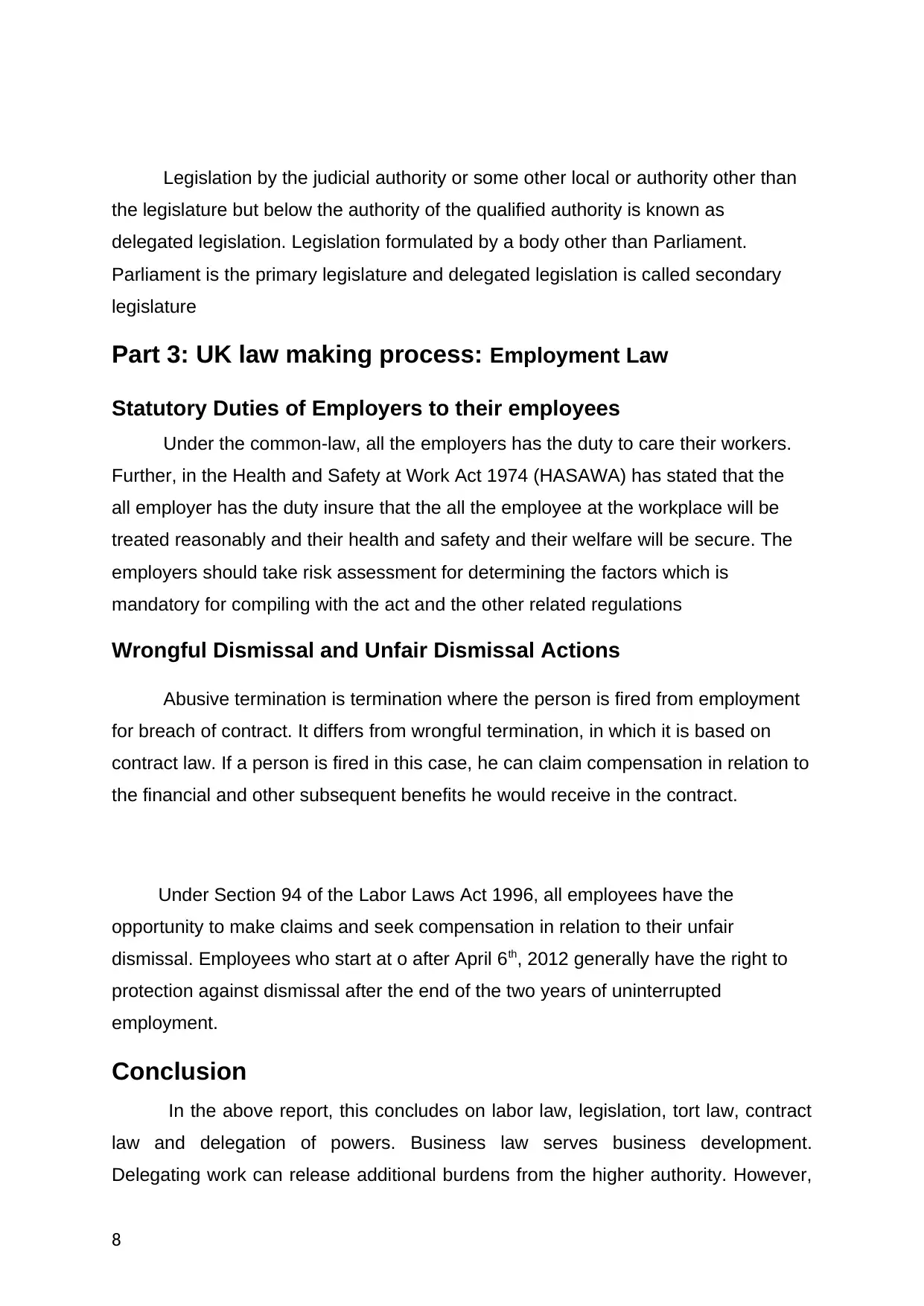
Legislation by the judicial authority or some other local or authority other than
the legislature but below the authority of the qualified authority is known as
delegated legislation. Legislation formulated by a body other than Parliament.
Parliament is the primary legislature and delegated legislation is called secondary
legislature
Part 3: UK law making process: Employment Law
Statutory Duties of Employers to their employees
Under the common-law, all the employers has the duty to care their workers.
Further, in the Health and Safety at Work Act 1974 (HASAWA) has stated that the
all employer has the duty insure that the all the employee at the workplace will be
treated reasonably and their health and safety and their welfare will be secure. The
employers should take risk assessment for determining the factors which is
mandatory for compiling with the act and the other related regulations
Wrongful Dismissal and Unfair Dismissal Actions
Abusive termination is termination where the person is fired from employment
for breach of contract. It differs from wrongful termination, in which it is based on
contract law. If a person is fired in this case, he can claim compensation in relation to
the financial and other subsequent benefits he would receive in the contract.
Under Section 94 of the Labor Laws Act 1996, all employees have the
opportunity to make claims and seek compensation in relation to their unfair
dismissal. Employees who start at o after April 6th, 2012 generally have the right to
protection against dismissal after the end of the two years of uninterrupted
employment.
Conclusion
In the above report, this concludes on labor law, legislation, tort law, contract
law and delegation of powers. Business law serves business development.
Delegating work can release additional burdens from the higher authority. However,
8
the legislature but below the authority of the qualified authority is known as
delegated legislation. Legislation formulated by a body other than Parliament.
Parliament is the primary legislature and delegated legislation is called secondary
legislature
Part 3: UK law making process: Employment Law
Statutory Duties of Employers to their employees
Under the common-law, all the employers has the duty to care their workers.
Further, in the Health and Safety at Work Act 1974 (HASAWA) has stated that the
all employer has the duty insure that the all the employee at the workplace will be
treated reasonably and their health and safety and their welfare will be secure. The
employers should take risk assessment for determining the factors which is
mandatory for compiling with the act and the other related regulations
Wrongful Dismissal and Unfair Dismissal Actions
Abusive termination is termination where the person is fired from employment
for breach of contract. It differs from wrongful termination, in which it is based on
contract law. If a person is fired in this case, he can claim compensation in relation to
the financial and other subsequent benefits he would receive in the contract.
Under Section 94 of the Labor Laws Act 1996, all employees have the
opportunity to make claims and seek compensation in relation to their unfair
dismissal. Employees who start at o after April 6th, 2012 generally have the right to
protection against dismissal after the end of the two years of uninterrupted
employment.
Conclusion
In the above report, this concludes on labor law, legislation, tort law, contract
law and delegation of powers. Business law serves business development.
Delegating work can release additional burdens from the higher authority. However,
8

the employer is obliged under the labor law of the country to fulfill an obligation
towards its employees.
9
towards its employees.
9
1 out of 9
Related Documents
Your All-in-One AI-Powered Toolkit for Academic Success.
+13062052269
info@desklib.com
Available 24*7 on WhatsApp / Email
![[object Object]](/_next/static/media/star-bottom.7253800d.svg)
Unlock your academic potential
© 2024 | Zucol Services PVT LTD | All rights reserved.



